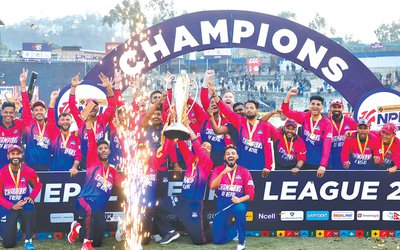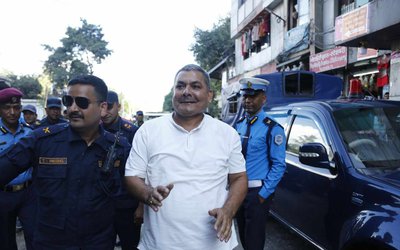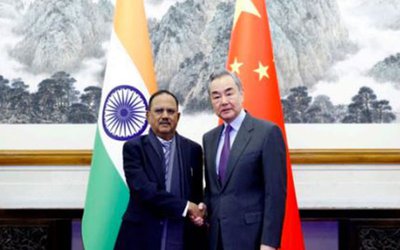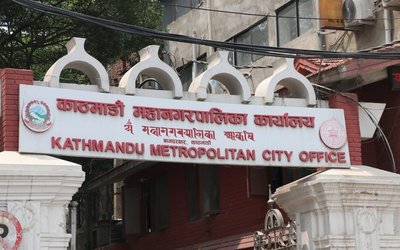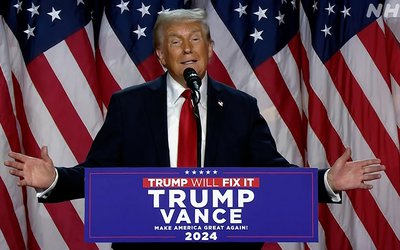Information Minister Jay prakash Gupta has issued a political threat, or come out with a sort of political prediction with an implied message that the Madhes region will not be part of what we call Nepal at present. Gupta has almost repeated what Sharad Singh Bhandari said four months ago, and paid the price for it by losing his position as the Defence Minister of the country.
Gupta may not know, and the people of Terai in particular know, Gupta does not command that support required to inflame the fire of secession in a region that has people’s loyalty to Nepal as firm as people in any other part of the country. Gupta, a man in the cockpit of power centre all through between 1990 and 2005, is trying to exaggerate the problems in Madhes to suit his political purpose. He, like a handful of ‘intellectual propagandists’, is trying to project Madhes as Katmandu’s ‘internal colony’ and appropriate the position of a ‘massiah’ (savior) for himself.
Gupta, unfortunately, is a Minister and draws the salary and other benefits from the state coffer to launch his campaign against is integrity and sovereignty. He lacks moral courage to announce that he has no respect for a sovereign territory called Nepal. He takes oath to defend its integrity but acts otherwise. But given Prime Minister Bhattarai’s recent statement that betrayed his lack of commitment for Nepal’s sovereignty and existence as an independent nation, Gupta must have felt more comfortable expressing himself in the manner he did. In that sense Gupta’s choice of timing was much appropriate from his tactical or strategic point of view.
He would be seen as the prominent lieutenant of Dr Bhattarai in the mission ‘wipe out Nepal’. Secondly, Gupta faces corruption case in the Supreme court, and the judgment coming in the next couple of weeks , has 50:50 chances of his being declared innocent or guilty. In the scenario, Gupta’s political career will end in Jail. Gupta had resigned from the constitutional council following demands made by civil society and human right activists that a person facing a corruption case in the supreme court should not be occupying a space in a body that will have role in the selection of judges.
Now, he is trying to build a case to have himself declared a ‘political martyr’, some one being framed up just because he belonged to certain part of the country. Some one who learnt his political A B C from B P Koirala who always discouraged sectarian politics and rejected it all through saying it will weaken the nation’s sovereignty also shows the degeneration that Nepali politics has gone through, especially in the post 2006 period. He is clearly exhibiting the psyche of a guilty already, even before the court has handed down its verdict.
But it is a real test case for the Legislature parliament and the constituent assembly as well. Can some one openly advocating secession continue in the council of ministers? Will Prime Minister Bhattarai follow what he did in Sharat Singh Bhandari’s case, or treat the Gupta case in altogether different way? Bhattarai’s failure to act will only lead to two conclusions: either he is politically impotent or he is out to finish Nepal as a sovereign nation. It is a also a challenge for the Nepali Congress, Maoists and the UML to prove that at least on the question of National sovereignty, they are one, and will not let Gupta to continue in the ministry.
Miserably, House Speaker Subhash Chandra Nembang has proved himself to be insensitive towards the cause of nationalism and democracy. He has demonstrated through his behavior and silence that the House is least bothered when ordinary people’s life and dignity is in peril. He has , through his silence, protected the position and status of criminals in the House feigning that absence of rule or law has come in the way of his taking action against the likes of Balakrishna Dhungel.
Ordinarily, it is believed that every ‘honourable member’ of the House is a patriot unless proved otherwise. But when he member makes a statement in detriment to the national integrity and nationhood, the House has every reason, and duty, to have it discussed, and the guilty punished. What purpose will a constitution swearing by the people and for the people serve if ministers are to freely warn that Nepal’s split is round the corner?
- SWISS SUPPORT: Construction Of A Trekking Trail In Koshi
- Dec 19, 2024
- PM OLI'S VISIT TO CHINA: BRI Agreement
- Dec 16, 2024
- RASUWAGADHI AND SANJEN: Begin Generation
- Dec 03, 2024
- NEPAL, INDIA ELECTRICITY TRADE Nepal's Advantage
- Dec 02, 2024
- PM Oli'S VISIT TO CHINA: Nepal's Dilemma
- Dec 01, 2024

